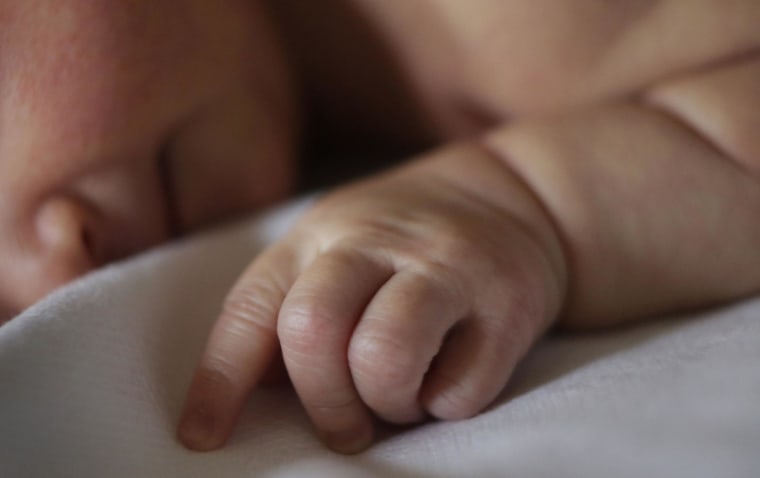The U.S. government is looking for newborns infected with the AIDS virus.
The National Institutes of Health says it will launch a trial, probably next week, in which newborns infected with the virus are treated with a strong, triple-whammy of HIV drugs to see if the babies can be cured.
The trial is inspired by the case of the so-called Mississippi baby, who made international headlines when doctors said they’d completely cleared her of HIV with a three-drug cocktail similar to the type used to treat adults. Now age 4, the little girl is likely cured, says Dr. Anthony Fauci, director of the National Institute of Allergy and Infectious Diseases (NIAID).
“We can’t find any virus in her many months after the therapy has been stopped,” Fauci told NBC News. That doesn’t even happen with adults treated for years.
Sign up for top health news direct to your inbox.
One of the many ways the AIDS virus is transmitted is during birth. An infected mother can infect her baby. But giving both mother and baby a few doses of two HIV drugs — AZT and nevirapine — can reduce this transmission by 99 percent.
Unfortunately, HIV infection is so common that even 1 percent represents a lot. And many pregnant women, including women in the United States, get so little prenatal care that they don’t even know they are infected until they are actually giving birth and it’s too late to protect the baby. Only half of women infected with HIV get the medications they need to protect their babies, the World Health Organization says.
In 2010, 162 babies were born with HIV in the 46 states where monitoring is done, the Centers for Disease Control and Prevention says.
That’s what happened with the Mississippi baby. She was a little premature and so stayed in the hospital. Within 30 hours of birth she was re-tested and had clear evidence of HIV infection. Unusually, she then got a cocktail of three drugs at a dose normally reserved for more advanced cases. It worked really well — pushing her virus down to what’s called undetectable levels.
“I don’t think there is going to be a problem recruiting in this case."
The baby and her mom, who doctors have never named, got regular care and treatment from Dr. Hannah Gay at University of Mississippi Medical Center until she was 15 months old. Then, like so many children, she disappeared off the doctors’ radar screens. The mother brought her back briefly at 18 months but disappeared again but she missed at least eight months' worth of drugs. When Gay caught up to her again, the baby was still well, despite having received no treatment. More remarkably, tests showed the virus had not come back.
In 2013, a second child was born in Long Beach, Calif. to a woman who doctors knew was not taking her HIV medication. The infant was treated immediately and the virus is now barely detectable.
To know if these cases represent real cures or are just flukes, researchers will have to do controlled trials, testing many babies.
Fauci says the NIAID-funded study will looks for 475 newborns and their mothers in the U.S., South America, Africa and elsewhere. “I don’t think there is going to be a problem recruiting in this case,” Fauci said.
“The babies are going to get treated within 48 hours of birth.” Instead of the brief, low-doses of AZT and nevirapine that newborns get to protect them from infection, these babies will get a three-drug cocktail and in higher doses that normally given infants.
“We don’t anticipate any problems because babies get treated (for HIV) frequently,” Fauci said.
Only one person — the so-called Berlin patient, Timothy Brown — has been cured of HIV infection. Brown had a bone marrow transplant for leukemia and the donor happened to have a genetic mutation that makes immune cells resist HIV infection. The transplant replaced his own infected cells with healthy, AIDS-resistant cells, and he remains free of the virus more than five years later.
But two other men who also got bone marrow transplants and who had hoped they were cured had their hopes dashed last December when the virus came back.
Fauci and others think newborns might be different. The human immunodeficiency virus is so hard to fight because it infects the very immune system cells that are sent to attack it. Then it hides out in the body. Drug cocktails can suppress the virus, but once they are stopped the virus comes back from its hiding place.
This hiding place, called a reservoir, may be the “memory” T-cells that the immune system makes to recognize previous intruders. “An infant doesn’t have any memory cells yet,” Fauci said.
It might be that a baby’s naïve immune system gives the virus nowhere to hide, so the HIV drugs can completely wipe it out. Doctors running the trials in babies will be looking for evidence of this.
